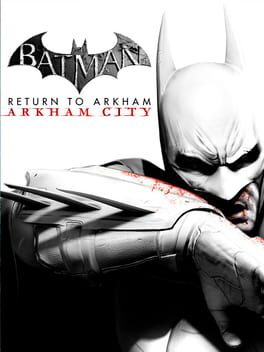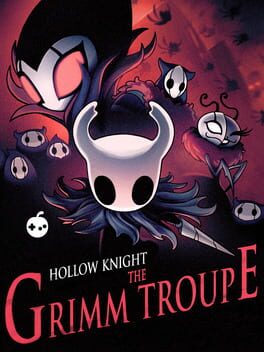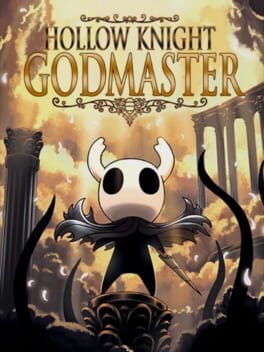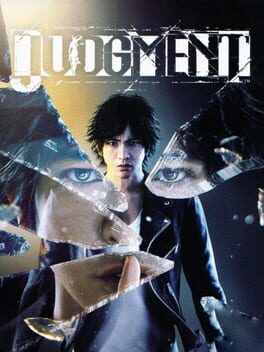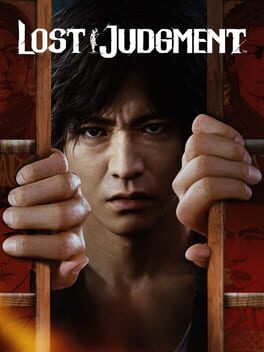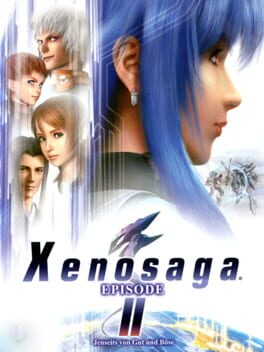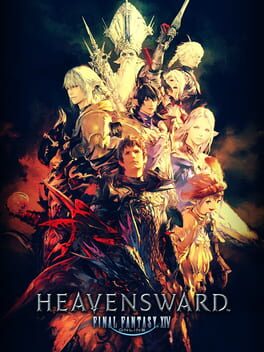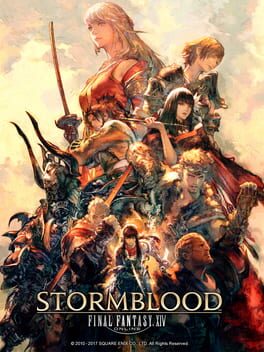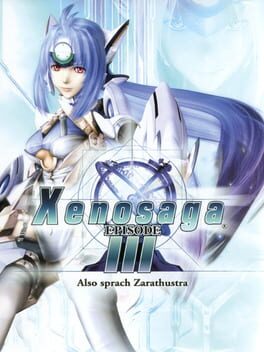Celicesama
1998
2017
2018
2021
2018
(I consider 3.1-3.3 as part of Heavensward's main story)
I think Heavensward is a great expansion on its own, but the experience was wholly elevated because I named my WoL "John Darksouls". Not gonna elaborate on the similarities between either story, but giving my character a dumb name contextualized the narrative in such an unironically beautiful way. It also made me care so much more about my "bland" MMO character and gave him and indelible sense of importance in the world.
Ramblings about my unique circumstances aside, Heavensward is, as I said, an honest-to-god great expansion that both builds on the foundations laid by ARR and plants seeds for future plot developments to come. Adore it and I think I'm beginning to see why this game is so beloved. Warrants the Final Fantasy moniker and then some.
I think Heavensward is a great expansion on its own, but the experience was wholly elevated because I named my WoL "John Darksouls". Not gonna elaborate on the similarities between either story, but giving my character a dumb name contextualized the narrative in such an unironically beautiful way. It also made me care so much more about my "bland" MMO character and gave him and indelible sense of importance in the world.
Ramblings about my unique circumstances aside, Heavensward is, as I said, an honest-to-god great expansion that both builds on the foundations laid by ARR and plants seeds for future plot developments to come. Adore it and I think I'm beginning to see why this game is so beloved. Warrants the Final Fantasy moniker and then some.
This review will not contain major spoilers, though I will mark some sections with light spoilers if necessary.
Xenosaga Episode III is a game I approached with the highest of expectations. While not talked about nearly enough in the gaming landscape, especially compared to its Blade brethren, it is regarded among the finest of the MonolithSoft's Xeno titles amongst the series' diehard fans, and I was eager to see why.
Cut back to April of 2023 when I was playing through Xenosaga Episode I. Great a game as it was for its unique approach to storytelling and presentation that could only be attributed to the idiosyncracies of Tetsuya Takahashi, I wasn't digging the combat much and put the game on hold when I reached the insurmountable wall that was Doppelwogel (fuck you). I was also on somewhat of a Xeno-burnout having just finished Gears, Xenoblade 3, and its Expansion within a timeframe of a few months.
Eventually I figured the longer I put it on hold, the longer it would take for me to get to it again. I knew I would have to experience the Xenosaga series sooner or later, and so in August of 2023, I started a fresh playthrough of Xenosaga I and eventually beat it. It was a thoroughly awesome time, though admittedly not without some glaring flaws, 'specially in regards to presentation and game-balancing.
Xenosaga Episode II was a much harder sell for me the whole way through. I still beat it, riding off the momentum of Episode I, but it was the game where some of the Xenosaga franchise's issues begun to came to light, and so I became more and more worried as I slowly approached the Monolithic title (no pun intended) that was Xenosaga III). For the record, I adore a lot about Xenosaga II. Sure the combat and presentation are rough around the edges, but when it hits, it hits hard. Episode I had its moments, but II was the game, in spite of its issues, that really sold me on the storytelling potential of the series, in spite of the general issues that plagued both games.
Then we get to the main topic of this review: Xenosaga Episode III. As a result of my mixed experienced with Episode II, I now approached Episode III with equal parts astronomical expectations and the lingering feeling that it might fail the expectations it so highly set up for itself. It was only inevitable.
(Spoilers for the first cutscene in the game)
Then I saw the opening cutscene. I don't want to exaggerate too much, but this may be the best first cutscene I've ever seen in a game. We see a boy and mother walking through a ravaged planet, ushering him to safety and giving him a chance to escape while she transforms into a Gnosis. Yuki Kajiura's beautiful score emphasizes a palpable sense of tragedy that continually echoes throughout the game. Everything about this opening was beautiful. The moment I saw this scene, I knew this game was going to be special.
(spoilers end)
The first thing about this game that becomes apparent the moment we gain control of our characters is how it re-centers the story's focus on Shion Uzuki. Episode I's second half and Episode II admittedly endeared me a lot to Jr, who I still consider one of the series' best characters, so the change back to Shion is a good way of re-acclimatizing us to her shoes, especially since Episode II did a ton of damage to her character.
More so than Jr in II, or Shion in I, Shion's role in Episode III is of absolute importance, more so than any of her contemporaries, KOS-MOS aside. It doesn't take long for the game to make Shion endearing again, which is especially important considering the fact that we spent several hours with no combat whatsoever, following Shion's story as she reconnects with her friends on Fifth Jerusalem.
A lot of this game's structure is heavily reliant on Shion. Everything from her character interactions to the progression of the plot to the main conflict is so Shion-centric that it tends to overshadow every other plotline in the game. It's here we get to the game's first major flaw, being that anything that isn't adjacent to Shion's character or journey tends to feel like an afterthought. Ziggy's subplot with Voyager suffers the most from this, as we only get around 2 or 3 whole scenes dedicated to the conflict before it is resolved. Alas, the point of this review is not to linger on such things.
Discussions have been had about this game, and this series' in general, poor pacing. It applies mostly to the gunshot pace of disc 2, though the first disc does suffer from this as well, particularly in regards to the Miltia arc, which happens to be highly Shion-centric. Perhaps we spend a little too long here, though it doesn't bother me much.
On the complete other end of the spectrum, everything that is adjacent to Shion in this game is explored to a damn-near masterful degree. Once again, the game tends to keep Shion herself at arms-length from the player, only giving us bits and pieces of her psyche, that is, until we reach Old Miltia for the first time. Though the Miltia arc's pacing is not quite perfect, it re-emphasizes the game's aggressive focus on Shion's character and opens up her past for all to see.
It is from Shion's mind where the game really begins to click. Shion's past is ugly, unsightly, unfathomable, all of it. From her mind and experiences, we are allowed to examine much of the game's central ideas from a closer angle. Trauma, cycles, the nature of waves and how we can influence each other, the whole lot. It's a travesty that Shion is as disliked as she is by a good number of people, because her character and the way it links the games core ideas in a way that is equal parts cohesive and emotional is pure artistry in video game storytelling.
(minor spoilers for the best cutscene in the game)
All of this culminates in one moment, being Allen and Shion's confrontation with the Red Testament in Michtam's core. This is not the first video game to make me cry, although it is the very first to make me sob like a lost child. This cutscene in everything to me. Once again, Kajiura's masterful score only serves to strengthen my already potent emotions. Watching the resolve of Allen, KOS-MOS, and later Shion brings more than a couple of tears to my eye, all of them warranted.
(minor spoilers end)
And all of this beautiful writing around Shion doesn't say anything about Jr's mini-arc and his conflict with Yuriev, the masterful dynamic of Jin and Margulis and their perfect duel in the Zohar facility, which stands as far-and-away my favorite boss in any turn-based RPG and a reaffirmation of the game's stellar mechanics, the heart-wrenching pain of KOS-MOS and everything she's had to go through, and the game's beautiful presentation, most of which holds up to this day.
With this, I can say that in spite of the flaws that plague it, Xenosaga Episode III not only met, but surpassed my astronomically high expectations and then some, and absolutely lives up to the Xeno mantle that Xenogears had started. GOAT, raw, fire, Peak Motherfucking Fiction.
Xenosaga Episode III is a game I approached with the highest of expectations. While not talked about nearly enough in the gaming landscape, especially compared to its Blade brethren, it is regarded among the finest of the MonolithSoft's Xeno titles amongst the series' diehard fans, and I was eager to see why.
Cut back to April of 2023 when I was playing through Xenosaga Episode I. Great a game as it was for its unique approach to storytelling and presentation that could only be attributed to the idiosyncracies of Tetsuya Takahashi, I wasn't digging the combat much and put the game on hold when I reached the insurmountable wall that was Doppelwogel (fuck you). I was also on somewhat of a Xeno-burnout having just finished Gears, Xenoblade 3, and its Expansion within a timeframe of a few months.
Eventually I figured the longer I put it on hold, the longer it would take for me to get to it again. I knew I would have to experience the Xenosaga series sooner or later, and so in August of 2023, I started a fresh playthrough of Xenosaga I and eventually beat it. It was a thoroughly awesome time, though admittedly not without some glaring flaws, 'specially in regards to presentation and game-balancing.
Xenosaga Episode II was a much harder sell for me the whole way through. I still beat it, riding off the momentum of Episode I, but it was the game where some of the Xenosaga franchise's issues begun to came to light, and so I became more and more worried as I slowly approached the Monolithic title (no pun intended) that was Xenosaga III). For the record, I adore a lot about Xenosaga II. Sure the combat and presentation are rough around the edges, but when it hits, it hits hard. Episode I had its moments, but II was the game, in spite of its issues, that really sold me on the storytelling potential of the series, in spite of the general issues that plagued both games.
Then we get to the main topic of this review: Xenosaga Episode III. As a result of my mixed experienced with Episode II, I now approached Episode III with equal parts astronomical expectations and the lingering feeling that it might fail the expectations it so highly set up for itself. It was only inevitable.
(Spoilers for the first cutscene in the game)
Then I saw the opening cutscene. I don't want to exaggerate too much, but this may be the best first cutscene I've ever seen in a game. We see a boy and mother walking through a ravaged planet, ushering him to safety and giving him a chance to escape while she transforms into a Gnosis. Yuki Kajiura's beautiful score emphasizes a palpable sense of tragedy that continually echoes throughout the game. Everything about this opening was beautiful. The moment I saw this scene, I knew this game was going to be special.
(spoilers end)
The first thing about this game that becomes apparent the moment we gain control of our characters is how it re-centers the story's focus on Shion Uzuki. Episode I's second half and Episode II admittedly endeared me a lot to Jr, who I still consider one of the series' best characters, so the change back to Shion is a good way of re-acclimatizing us to her shoes, especially since Episode II did a ton of damage to her character.
More so than Jr in II, or Shion in I, Shion's role in Episode III is of absolute importance, more so than any of her contemporaries, KOS-MOS aside. It doesn't take long for the game to make Shion endearing again, which is especially important considering the fact that we spent several hours with no combat whatsoever, following Shion's story as she reconnects with her friends on Fifth Jerusalem.
A lot of this game's structure is heavily reliant on Shion. Everything from her character interactions to the progression of the plot to the main conflict is so Shion-centric that it tends to overshadow every other plotline in the game. It's here we get to the game's first major flaw, being that anything that isn't adjacent to Shion's character or journey tends to feel like an afterthought. Ziggy's subplot with Voyager suffers the most from this, as we only get around 2 or 3 whole scenes dedicated to the conflict before it is resolved. Alas, the point of this review is not to linger on such things.
Discussions have been had about this game, and this series' in general, poor pacing. It applies mostly to the gunshot pace of disc 2, though the first disc does suffer from this as well, particularly in regards to the Miltia arc, which happens to be highly Shion-centric. Perhaps we spend a little too long here, though it doesn't bother me much.
On the complete other end of the spectrum, everything that is adjacent to Shion in this game is explored to a damn-near masterful degree. Once again, the game tends to keep Shion herself at arms-length from the player, only giving us bits and pieces of her psyche, that is, until we reach Old Miltia for the first time. Though the Miltia arc's pacing is not quite perfect, it re-emphasizes the game's aggressive focus on Shion's character and opens up her past for all to see.
It is from Shion's mind where the game really begins to click. Shion's past is ugly, unsightly, unfathomable, all of it. From her mind and experiences, we are allowed to examine much of the game's central ideas from a closer angle. Trauma, cycles, the nature of waves and how we can influence each other, the whole lot. It's a travesty that Shion is as disliked as she is by a good number of people, because her character and the way it links the games core ideas in a way that is equal parts cohesive and emotional is pure artistry in video game storytelling.
(minor spoilers for the best cutscene in the game)
All of this culminates in one moment, being Allen and Shion's confrontation with the Red Testament in Michtam's core. This is not the first video game to make me cry, although it is the very first to make me sob like a lost child. This cutscene in everything to me. Once again, Kajiura's masterful score only serves to strengthen my already potent emotions. Watching the resolve of Allen, KOS-MOS, and later Shion brings more than a couple of tears to my eye, all of them warranted.
(minor spoilers end)
And all of this beautiful writing around Shion doesn't say anything about Jr's mini-arc and his conflict with Yuriev, the masterful dynamic of Jin and Margulis and their perfect duel in the Zohar facility, which stands as far-and-away my favorite boss in any turn-based RPG and a reaffirmation of the game's stellar mechanics, the heart-wrenching pain of KOS-MOS and everything she's had to go through, and the game's beautiful presentation, most of which holds up to this day.
With this, I can say that in spite of the flaws that plague it, Xenosaga Episode III not only met, but surpassed my astronomically high expectations and then some, and absolutely lives up to the Xeno mantle that Xenogears had started. GOAT, raw, fire, Peak Motherfucking Fiction.


